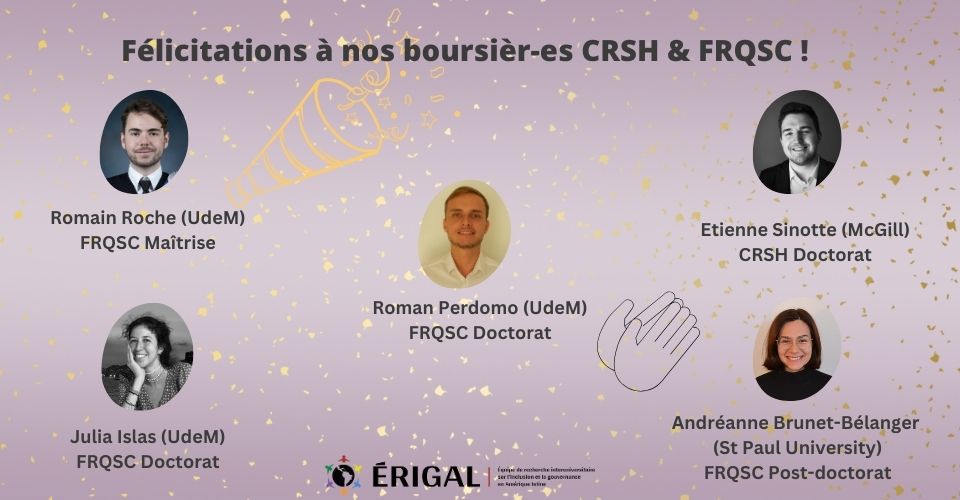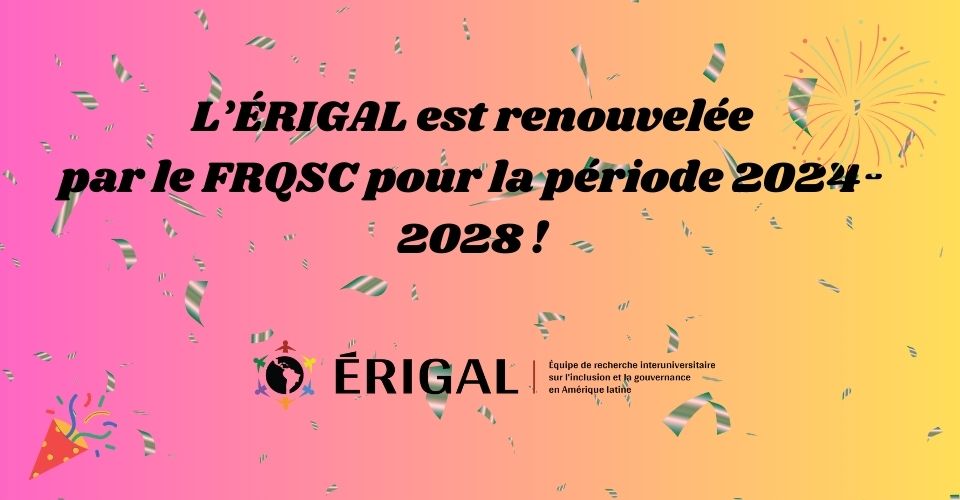Congratulations to our SSHRC & FRQSC scholarship recipients!

Congratulations to Andréanne Brunet-Bélanger, who has been awarded the Fonds de recherche du Québec Société et cultures (FRQSC) Postdoctoral Research Fellowship, Roman Perdomo, who has been awarded the FRQSC Doctoral Research Fellowship, Julia Islas, who has been awarded the FRQSC Doctoral Research Fellowship, Romain Roche, who has been awarded the FRQSC Master's Research Fellowship, and Étienne Sinotte, who has been awarded the SSHRC JA Bombardier Doctoral Fellowship!
Andréanne Brunet-Bélanger's project studies alternative forms of philanthropic models, with a particular focus on ethnic philanthropy, defined as the commitment of members of a community to offer private or community resources to other members of their own ethnic group. The main objective is to better understand ethnic philanthropy in Canada, focusing on the practices of Latinx diaspora groups in North America: how and for what purpose do members of Latinx communities in Canada engage in philanthropic actions? There are few studies on ethnic philanthropy, and even fewer on the practices, impacts and motivations behind it. Studies of philanthropy have often privileged Western perspectives of what philanthropy is, neglecting philanthropic traditions within ethnic communities and other marginalized groups. What's more, traditional philanthropy gives a very limited share - 1.3% of donations - to Latinx communities. This project aims to fill in the gaps on emerging and alternative practices in philanthropic models, particularly in a context where immigration continues to grow and host resources remain limited. He will focus specifically on one aspect of ethnic philanthropy in Canada, namely philanthropy from Latinx diasporic groups.
Roman Perdomo's project focuses on the work of whistle-blowers in Brazil and Peru. Since the 1980s, a number of countries have introduced public whistle-blowing policies to combat corruption, particularly in Latin America. These policies have led to the establishment of institutional mechanisms for collecting whistleblowers' reports and protecting them. However, there is no consensus in the literature on the effectiveness of these policies. What are the effects of public whistleblower policies on the success of whistleblowing mechanisms? The thesis argues that the institutions deployed to collect whistleblowers structure whistleblower policy, leading to the strengthening of anti-corruption public policies. The hypothesis is that the success of whistleblowing mechanisms is favored by two main factors: well-designed and well-implemented whistleblower public policies; and the mobilization of a powerful whistleblower network. The thesis aims to measure the effectiveness of public whistleblowing policies, particularly in Latin America, where work on the issue is emerging.
Julia Islas' project examines lesbian women's involvement in public health care in Mexico City. The lesbian movement in Mexico City, although present since 1976 with the creation of organizations such as "Acratas", is experiencing a resurgence marked by the emergence of new collectives such as La Comuna Lencha Trans and MarchaLencha in 2020 and 2021. These collectives highlight persistent tensions within the Mexican LGBTQI+ movement, questioning the historical dominance of gay men in political discourse and organization, which often invisibilizes lesbian women. This questioning reveals a growing need to recognize and respond to the diverse realities and needs within the LGBTQI+ community. Moreover, the evolution of generations of lesbian women underscores a paradigm shift. Whereas previous generations were inclined to be discreet about their sexuality in the public space, younger generations are now openly asserting their right to visibility. Yet lesbians' relationship to the right to the city, to public space and, more generally, to citizenship, is configured differently, offering a wide range of possibilities and alternative forms that lesbians mobilize in the creation of spaces for encounter and conviviality. This observation calls into question the binary categories of temporary and permanent, public and private. In the context of this project, then, it is pertinent to ask why, despite their stated desire for visibility and specific spaces, the lesbian community remains largely absent from the public sphere?
Romain Roche's project aims to explore the long-term effects of social mobilizations for the right to the city in a context of gentrification on relations between municipal governments and organized citizen groups in Rio de Janeiro. In Latin America, gentrification is intrinsically linked with the idea of restructuring and improving the urban fabric of large metropolises to make them more attractive and competitive in the context of neo-liberal economic development that characterizes today's cities. This is particularly true of Rio de Janeiro, once perceived as a city of social inequality, violence and poverty, whose recent development has been marked by the hosting of major international events. To protect their living environment, citizens have put up resistance that, depending on the case, has been more or less effective. How have the mobilizations for the right to the city in the 2010s impacted the current relationship between municipal political actors and residents of disadvantaged and marginalized neighborhoods? The aim is to contribute to research on the reconciliation between the right to the city and social diversity, on the one hand, and urban development, the fight against informal urbanization and the revitalization of disadvantaged neighborhoods, on the other.
Finally, Étienne Sinotte's project looks at the convergence of environmental and human rights struggles through political violence in Brazil and Peru. Brazil and Peru face the threat of the expansion of extractive industries such as mining and logging. Faced with the risks of expropriation and destruction of land and ecosystems, activists in both countries are mobilizing against the institutions and companies promoting or carrying out extractive projects, sometimes with fatal consequences. Indeed, these countries employ insidious repressive methods against activists, including enforced disappearance and murder, with the aim of silencing them to facilitate resource extraction and profit-making. In response to these forms of repression, non-governmental organizations (NGOs) focusing on environmental issues in the region have adopted human rights claims, leading to the convergence of environmental and human rights struggles. This research aims to investigate the process of struggle convergence in the cases discussed, as they differ from the typical cases studied in the literature on struggle convergence, usually focusing on the formation of alliances or coalitions that are not necessarily formed in the cases described. Consequently, how does political violence against environmental activists lead environmental NGOs to reformulate their discourse and rethink their actions in convergence with human rights organizations?
Congratulations to all!


